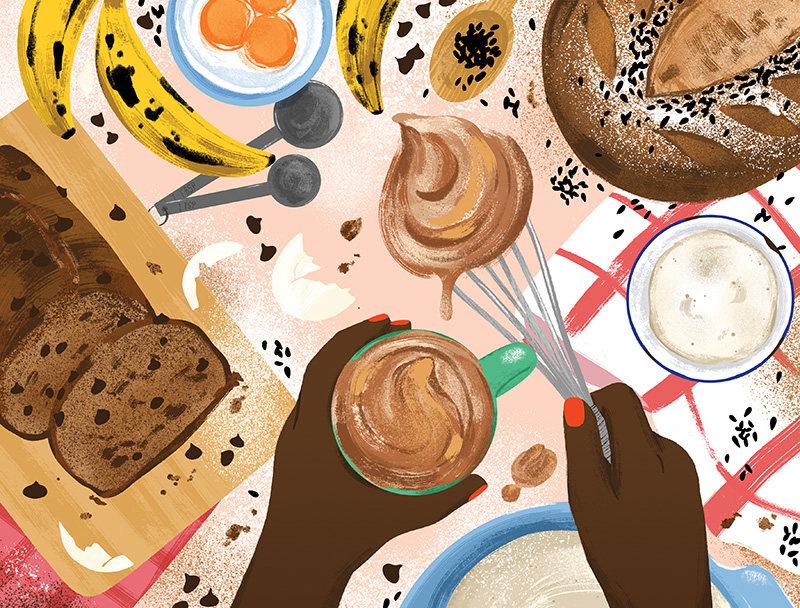
In pre-COVID times, you might have been too busy to spend time in the kitchen, but over the past nine-plus months, cooking at home has become a saving grace for many of us. Quarantine cooking allowed home chefs to spend time mastering classic recipes or learning new ones through cooking shows or virtual lessons from local chefs.
Remember when bags of flour were flying off of supermarket shelves? Turns out, baking aficionados across the country were churning flour into loaves of banana bread and sourdough starters in droves. Bread became a social media star, and it wasn’t alone. Images of Dalgona coffee, made of instant coffee whisked with sugar and water to create a fluffy, caramel-colored whipped topping over milk, dominated our timelines. Enthusiasts bonded over the Instagram hashtag #dalgonacoffeechallenge and even started a page under the same name. It had 14,500 die-hard followers by late October.
Since we’ll likely still be doing a lot of home cooking well into 2021, we asked several local chefs how home cooks can keep the momentum going. From using more nonperishable items to mastering techniques to reduce food waste, here are some ways they suggested to step it up in your home kitchen and try some chef-approved food trends in the new year.
1. Eat more beans
With so much fear and uncertainty in the early days of the pandemic, food shortages inevitably forced home cooks to make use of what was available in their kitchen pantries — particularly, nonperishable items such as dry beans. Beans were already starting to grow in popularity among home cooks near the end of 2019, before skyrocketing in February and March when they became a prized, hoarded ingredient.
Chef Jess Hicks, part owner of Ochre Bakery and Astro Coffee, wants people to keep eating beans in abundance in 2021. “I love personally that in quarantine people were eating so many beans, because I feel like I have a personal life mission to make people eat beans every other meal,” she laughs. “I feel like it’s such an underrated food.”
Chef Nik Cole, head chef at The Kitchen By Cooking With Que and owner of Fork + Knife & Food catering company, agrees. She enjoys cooking with grains and legumes and wants to see more people eating foods such as grits, cornmeal, and black-eyed peas. “I just started eating black-eyed peas this year, but I love them so much,” she says. While in quarantine, Cole experimented with black-eyed peas and used them in salsas and as a topping on bruschetta.

2. Hand-make your pasta
If you have sourdough fatigue or are looking for a new project, chef Kate Williams, owner of Lady of the House and Karl’s, suggests making fresh pasta. It’s not as hard as you think, she says. In fact, she says it’s simple, especially for anyone who has a stand mixer. Even if you don’t, though, you can still make pasta by hand — writer and chef Samin Nosrat provides a must-watch visual demonstration on the quarantine-favorite Netflix docuseries based on her cookbook, Salt, Fat, Acid, Heat. “It’s very cost-effective to make pasta at home,” Williams says. “Sourdough takes a little bit of skill and patience; making pasta is very therapeutic.”
3. Preserve fruits, vegetables, and herbs
Pastry chef Warda Bouguettaya, owner of Warda Pâtisserie in Detroit’s Eastern Market area, took advantage of quarantine by preserving herbs and vegetables. “I was literally using every part of the vegetables I had and saved things by freezing them,” she says. She tried various techniques, such as using basil to make pesto and chopping and freezing scallions. She used up her tomatoes by roasting them with olive oil and storing them for later. “I think there’s probably 50 pounds of tomato sauce in my freezer right now,” she says.
Bouguettaya hopes more people will preserve their produce in 2021 because doing so also helps to prevent food waste. The pandemic intensified the nation’s existing food waste problem when large farms across the country were forced to destroy tens of millions of pounds of fresh food they couldn’t sell to closed restaurants, hotels, and schools. The local collective Make Food Not Waste offers resources and hosts an annual community feast at Eastern Market in September. The event went virtual this year with a five-episode cooking series featuring Detroit mixologists, chefs, and bakers showing home cooks how to waste less food at home. Visit makefoodnotwaste.org to watch episode replays.

4. Ferment your food
We may not see the last of sourdough starters on our timelines any time soon. Making sourdough bread is like the gateway to fermenting, the process of transforming foods with microorganisms such as bacteria, yeasts, or mold. Although it’s a technique long used in other cultures, Marrow’s executive chef, Sarah Welch, says she noticed the food trend picking up steam here in the States earlier this year. “I love the idea of people incorporating fermented foods into what they’re making at home,” she says.
With fermentation, all the ingredients that people throw away can be turned into something, which also helps to limit food waste, Welch explains. For instance, she says people don’t have to worry about eating all their vegetables right away. “Arguably, it’s better if you salt them and let them rot a little bit,” she says. There is a technique for fermenting safely. Visit marrowdetroit.com to inquire about classes on fermentation.
5. Be confident in the kitchen
Ultimately, local chefs are encouraging home cooks to keep doing what they’re doing, because cooking for yourself and your family is empowering, Williams says. She wants people to continue learning how to cook with what’s in their pantry and know that they don’t need a 30-ingredient recipe to make a great meal.
Additionally, Hicks wants home cooks to learn how to prepare meals without recipes. “Learn to trust your instinct and mix ingredients and develop your own sense of taste,” she urges, adding that recipes can inhibit the joy of cooking. The secret to becoming less reliant on recipes? Technique. Hicks says you really only need to master a handful of techniques — roasting, grilling, and soup making to name a few — and you can cook anything.
If nothing else, Hicks says, you can make almost anything taste better by drizzling it with olive oil, sprinkling it with salt, and tossing it in the oven
|
|
|









